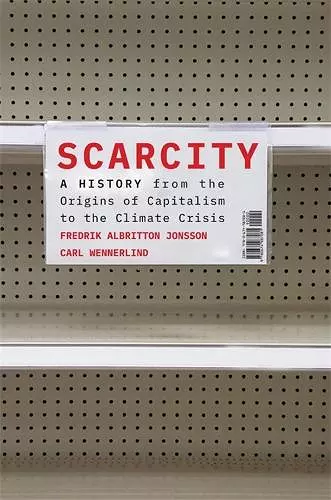Scarcity
A History from the Origins of Capitalism to the Climate Crisis
Fredrik Albritton Jonsson author Carl Wennerlind author
Format:Hardback
Publisher:Harvard University Press
Published:5th May '23
Should be back in stock very soon

A sweeping intellectual history of the concept of economic scarcity—its development across five hundred years of European thought and its decisive role in fostering the climate crisis.
Modern economics presumes a particular view of scarcity, in which human beings are innately possessed of infinite desires and society must therefore facilitate endless growth and consumption irrespective of nature’s limits. Yet as Fredrik Albritton Jonsson and Carl Wennerlind show, this vision of scarcity is historically novel and was not inevitable even in the age of capitalism. Rather, it reflects the costly triumph of infinite-growth ideologies across centuries of European economic thought—at the expense of traditions that sought to live within nature’s constraints.
The dominant conception of scarcity today holds that, rather than master our desires, humans must master nature to meet those desires. Albritton Jonsson and Wennerlind argue that this idea was developed by thinkers such as Francis Bacon, Samuel Hartlib, Alfred Marshall, and Paul Samuelson, who laid the groundwork for today’s hegemonic politics of growth. Yet proponents of infinite growth have long faced resistance from agrarian radicals, romantic poets, revolutionary socialists, ecofeminists, and others. These critics—including the likes of Gerrard Winstanley, Dorothy Wordsworth, Karl Marx, and Hannah Arendt—embraced conceptions of scarcity in which our desires, rather than nature, must be mastered to achieve the social good. In so doing, they dramatically reenvisioned how humans might interact with both nature and the economy.
Following these conflicts into the twenty-first century, Albritton Jonsson and Wennerlind insist that we need new, sustainable models of economic thinking to address the climate crisis. Scarcity is not only a critique of infinite growth, but also a timely invitation to imagine alternative ways of flourishing on Earth.
Scarcity connects, dissects, and narrates the history of Western economic ideas about the natural limits to human societies…A new classic for historians of ideas. -- Erle C. Ellis * Science *
Fascinating…The detailed narrative in Scarcity unpacks a dizzying array of “scarcities”… the pen portraits of key thinkers’ ideas about the relationship between population and resources are deft and extremely well written. Some of these portraits are familiar, but less obvious connections are drawn between the well-established history of political economy and economics, and a broader set of writers…the links are stimulating and well evidenced in this exceptionally ambitious piece of intellectual history. -- Robert Mayhew * Times Literary Supplement *
Albritton Jonsson and Wennerlind take an ambitious, sweeping approach [to scarcity]: their book covers 500 years, dividing generalized scarcity into seven subcategories and proposing that we reduce the influence of scarcity-based economics on how we deal with our planetary crises. Their critique is unequivocal. -- Scott R. MacKenzie * Los Angeles Review of Books *
Scarcity offers a crash course on the many musings that philosophers, artists, theologians, and economists have had on the topic…[Albritton] Jonsson and Wennerlind’s historical investigations helpfully illustrate how tawdry matters of getting and spending have always been underlaid by questions about man, nature, technology, and their relations. -- Robert Bellafiore * Public Discourse *
Contains rich and illuminating discussion of the material culture and everyday life of early modern Europeans as well as the coevolution of European taste, capitalism, and empire…a beautifully written and thought-provoking history of economic ideas in their ecological and cultural context. -- Jamie Martin * Journal of Modern History *
Brisk, clear, and engaging…a lively and useful introductory overview. -- Trevor Jackson * American Historical Review *
In their insightful Scarcity: A History from the Origins of Capitalism to the Climate Crisis, academic historians Frederick Albritton Jonsson and Carl Wennerlind argue that capitalist society needs to rethink the relation between the economy and nature. …Thorough and astute. -- Ian Miller * H-Net Reviews *
An insightful and illuminating book. The history of economic thought has been jettisoned from the curriculum of most economics departments, to the great disadvantage of students. Examining the many historical meanings of ‘scarcity,’ Albritton Jonsson and Wennerlind make a significant contribution both to curricular repair and to clear thinking about future economic policy. -- Herman Daly, author of Beyond Growth: The Economics of Sustainable Development
Rarely does a book cause you to reflect anew on ideas so fundamental to your life that they have become invisible. Scarcity does just this for dominant economic assumptions about the infinite nature of human appetites. Through a refreshing tour of European philosophical and economic thought, Albritton Jonsson and Wennerlind show how growth ideologies became ascendent—but also how regularly and thoroughly such ideas have been critiqued. The result is not just an intellectual history, but a primer on how to rethink our relationship with nature and the economy in a time of crisis. -- Bathsheba Demuth, author of Floating Coast: An Environmental History of the Bering Strait
A brilliant book—lucid, luminescent, and learned—that is relevant across disciplines. Albritton Jonsson and Wennerlind expertly present centuries of Western debates about the relationship between nature and economy, alternating between visions of cornucopian abundance and earthly limits. The result is a timely intellectual genealogy for terms that define our contemporary debates on the planetary environment. -- Dipesh Chakrabarty, author of The Climate of History in a Planetary Age
Tracing the long history of associations between scarcity and capitalism, this exemplary work examines the human hunger for abundance and its calamitous impact on the planet. Albritton Jonsson and Wennerlind show the potential of intellectual history to shed light on the problems that most bedevil our time, to the benefit of both scholarship and society at large. -- Francesco Boldizzoni, author of Foretelling the End of Capitalism
ISBN: 9780674987081
Dimensions: 235mm x 156mm x 27mm
Weight: 635g
304 pages